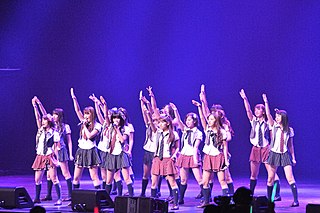
Anime is hand-drawn and computer animation originating from or associated with Japan.
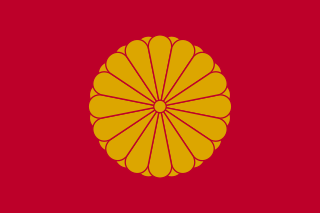
The Emperor of Japan is the head of the Imperial Family and the head of state of Japan. Under the 1947 constitution, he is defined as "the symbol of the State and of the unity of the people." Historically, he was also the highest authority of the Shinto religion. In Japanese, the Emperor is called Tennō (天皇), literally "heavenly sovereign". In English, the use of the term Mikado for the Emperor was once common, but is now considered obsolete.
Japanese is an East Asian language spoken by about 128 million people, primarily in Japan, where it is the national language. It is a member of the Japonic language family, and its relation to other languages, such as Korean, is debated. Japanese has been grouped with language families such as Ainu, Austroasiatic, and the now-discredited Altaic, but none of these proposals has gained widespread acceptance.

Manga are comics or graphic novels created in Japan or by creators in the Japanese language, conforming to a style developed in Japan in the late 19th century. They have a long and complex pre-history in earlier Japanese art.

Sushi is a Japanese dish of prepared vinegared rice, usually with some sugar and salt, accompanying a variety of ingredients, such as seafood, vegetables, and occasionally tropical fruits. Styles of sushi and its presentation vary widely, but the one key ingredient is "sushi rice", also referred to as shari (しゃり), or sumeshi (酢飯). The term sushi is no longer used in its original context; it literally means "sour-tasting".
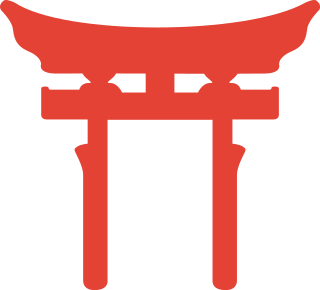
Shinto or kami-no-michi is the traditional religion of Japan that focuses on ritual practices to be carried out diligently to establish a connection between present-day Japan and its ancient past.
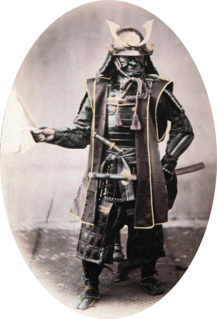
Samurai (侍) were the military nobility and officer caste of medieval and early-modern Japan.

World War II, also known as the Second World War, was a global war that lasted from 1939 to 1945. The vast majority of the world's countries—including all the great powers—eventually formed two opposing military alliances: the Allies and the Axis. A state of total war emerged, directly involving more than 100 million people from over 30 countries. The major participants threw their entire economic, industrial, and scientific capabilities behind the war effort, blurring the distinction between civilian and military resources. World War II was the deadliest conflict in human history, marked by 50 to 85 million fatalities, most of whom were civilians in the Soviet Union and China. It included massacres, the genocide of the Holocaust, strategic bombing, premeditated death from starvation and disease, and the only use of nuclear weapons in war.

Kanji are the adopted logographic Chinese characters that are used in the Japanese writing system. They are used alongside the Japanese syllabic scripts hiragana and katakana. The Japanese term kanji for the Chinese characters literally means "Han characters". It is written with the same characters in the Chinese language to refer to the character writing system, hanzi (漢字).

The Russo-Japanese War was fought during 1904-1905 between the Russian Empire and the Empire of Japan over rival imperial ambitions in Manchuria and Korea. The major theatres of operations were the Liaodong Peninsula and Mukden in Southern Manchuria and the seas around Korea, Japan and the Yellow Sea.

The attack on Pearl Harbor was a surprise military strike by the Imperial Japanese Navy Air Service upon the United States against the naval base at Pearl Harbor in Honolulu, Hawaii on Sunday morning, December 7, 1941. The attack led to the United States' formal entry into World War II the next day. The Japanese military leadership referred to the attack as the Hawaii Operation and Operation AI, and as Operation Z during its planning.

The Battle of Midway was a decisive naval battle in the Pacific Theater of World War II that took place between 4 and 7 June 1942, only six months after Japan's attack on Pearl Harbor and one month after the Battle of the Coral Sea. The United States Navy under Admirals Chester Nimitz, Frank Jack Fletcher, and Raymond A. Spruance defeated an attacking fleet of the Imperial Japanese Navy under Admirals Isoroku Yamamoto, Chūichi Nagumo, and Nobutake Kondō near Midway Atoll, inflicting devastating damage on the Japanese fleet that proved irreparable. Military historian John Keegan called it "the most stunning and decisive blow in the history of naval warfare".

The Second Sino-Japanese War was a military conflict fought primarily between the Republic of China and the Empire of Japan from July 7, 1937, to September 2, 1945. It began with the Marco Polo Bridge Incident in 1937 in which a dispute between Japanese and Chinese troops escalated into a battle. Some sources in the modern People's Republic of China date the beginning of the war to the Japanese invasion of Manchuria in 1931.
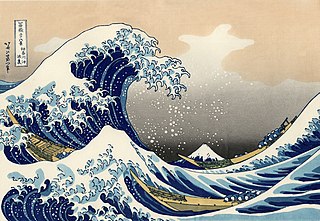
The Edo period or Tokugawa period (徳川時代) is the period between 1603 and 1868 in the history of Japan, when Japanese society was under the rule of the Tokugawa shogunate and the country's 300 regional daimyō. The period was characterized by economic growth, strict social order, isolationist foreign policies, a stable population, "no more wars", and popular enjoyment of arts and culture. The shogunate was officially established in Edo on March 24, 1603, by Tokugawa Ieyasu. The period came to an end with the Meiji Restoration on May 3, 1868, after the fall of Edo.

The Empire of Japan was the historical nation-state and great power that existed from the Meiji Restoration in 1868 to the enactment of the 1947 constitution of modern Japan.

A music download is the digital transfer of music via the Internet into a device capable of decoding and playing it, such as a home computer, MP3 player or smartphone. This term encompasses both legal downloads and downloads of copyrighted material without permission or legal payment. According to a Nielsen report, downloadable music accounted for 55.9% of all music sales in the US in 2012. By the beginning of 2011, Apple's iTunes Store alone made US$1.1 billion of revenue in the first quarter of its fiscal year.

Fergal Devitt is an Irish professional wrestler signed to WWE, where he performs on the SmackDown brand under the ring name Finn Bálor where he is the current Intercontinental Champion in his second reign.

During the final stage of World War II, the United States detonated two nuclear weapons over the Japanese cities of Hiroshima and Nagasaki on August 6 and 9, 1945, respectively. The United States dropped the bombs after obtaining the consent of the United Kingdom, as required by the Quebec Agreement. The two bombings killed 129,000–226,000 people, most of whom were civilians. They remain the only use of nuclear weapons in the history of armed conflict.

Manuel Alfonso Andrade Oropeza is a Mexican professional wrestler currently signed to WWE, where he performs on the SmackDown brand under the ring name Andrade. He is a one-time NXT Champion. He previously wrestled for Consejo Mundial de Lucha Libre (CMLL) from 2007 until 2015 under the ring name La Sombra. He made his professional wrestling debut a month before his 14th birthday and worked initially as Brillante Jr.

